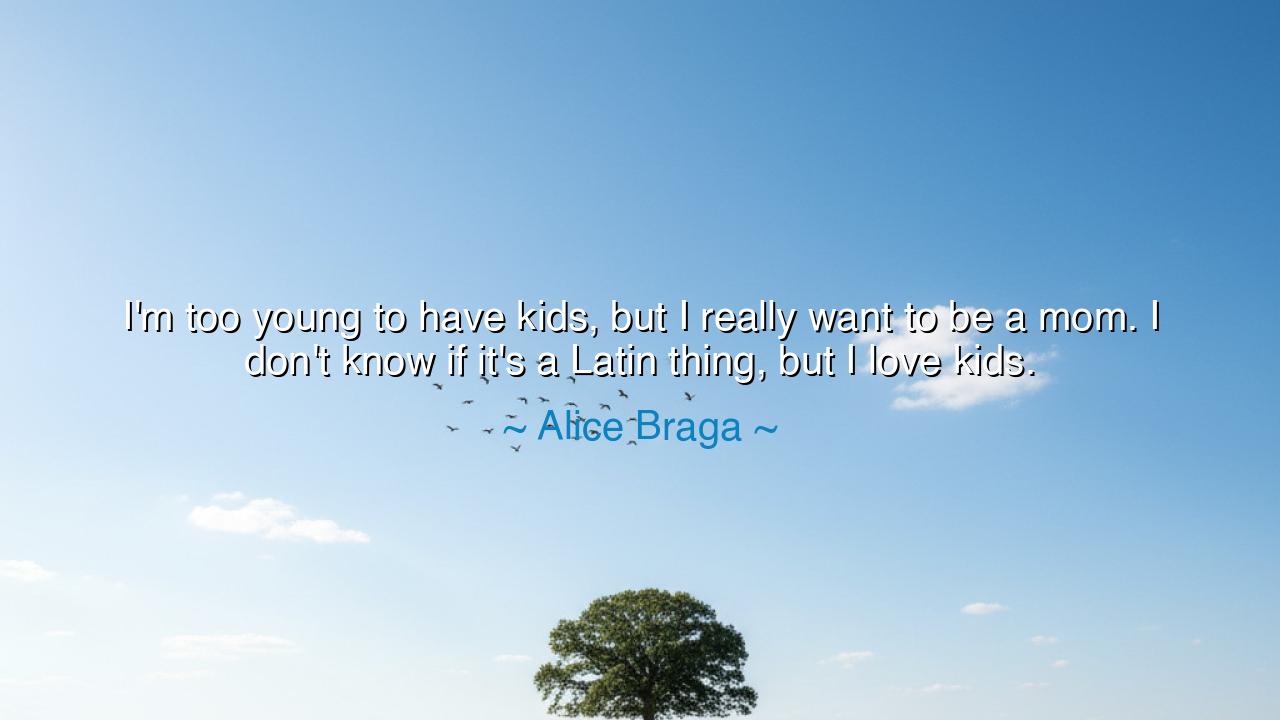
I'm too young to have kids, but I really want to be a mom. I
I'm too young to have kids, but I really want to be a mom. I don't know if it's a Latin thing, but I love kids.






There are moments in life when the instinct of creation, the desire to nurture, and the longing to give life seem to awaken long before their time. In the words of Alice Braga, “I’m too young to have kids, but I really want to be a mom. I don’t know if it’s a Latin thing, but I love kids,” we hear the voice of an ancient and eternal yearning — the call of motherhood, both literal and spiritual. This desire transcends biology or age; it is the whisper of generations, the echo of countless women who have carried the torch of compassion, protection, and love. It is not merely about bearing children, but about wanting to create, to nurture, to give of oneself to something tender and full of promise.
There is in her words a tension between youth and destiny. She speaks of being too young, yet feeling already called to a role as old as the dawn of humankind. The ancients would have understood this deeply, for they saw motherhood not as a stage of life, but as an essence of the soul. Even those who never bore children were still mothers to the world — teachers, healers, artists, midwives of wisdom and hope. In the heart of a young woman, the dream of being a mother is a flame that speaks of her capacity for empathy, her courage to protect, and her yearning to see innocence thrive in a world that often forgets it.
To say, “I love kids,” is to declare allegiance to life itself. It is to affirm faith in the future, to smile at the small hands that will someday hold the fate of nations. Perhaps Braga’s mention of her Latin heritage is not incidental. In many Latin cultures, family is the sun around which life orbits — the gathering place of laughter, stories, and tears. There, to love children is to love life’s vitality, its color, its spirit. It is to see in every child a reflection of the ancestors, and a promise to continue their song. In this way, motherhood is not only an act of nature, but a cultural flame, kept alive across generations.
Consider the story of Mother Teresa of Calcutta — a woman who bore no children of her own, yet became a mother to millions. Her arms, worn by service, embraced the sick, the dying, and the abandoned. Her love was not confined by biology, but defined by devotion. Like Alice Braga, she might have said she was “too young” when the calling first touched her heart. Yet she listened. She gave her youth, her life, her tenderness, to those who needed it most. Her motherhood was spiritual, yet no less powerful than the woman who bears a child. It teaches us that the desire to nurture is sacred, no matter where it is directed.
In Braga’s confession, we also glimpse the innocence of hope — the dream of one day giving love freely, without restraint or fear. It is not a selfish desire, but a generative one: the wish to pour one’s soul into the next generation. The ancients would have likened this to planting a seed in fertile soil — the seed of continuity, the seed of legacy. Every great civilization understood that those who love children, who protect and teach them, are the true guardians of tomorrow. Through such hearts, the wisdom of the past survives, the songs of ancestors echo on, and the world renews itself.
Yet, her words also remind us of balance. To desire motherhood is beautiful, but one must also grow, learn, and strengthen before taking on such a sacred task. Even the most fertile soil must be prepared before the seed takes root. The young heart that longs for motherhood must also learn patience, discipline, and the strength to love wisely. It is not enough to love children; one must also be ready to sacrifice for them, to guide them through storms. The ancients said that “a mother’s heart is a forge of endurance,” and indeed, the true mother — whether young or old, biological or spiritual — learns to transform love into wisdom.
In the end, the lesson of Alice Braga’s words is clear: listen to the instincts that call you toward love, but walk the path with mindfulness. Do not suppress the nurturing heart within you, for it is one of humanity’s purest gifts. Whether you express it by raising a child, protecting others, or creating something beautiful — let that maternal energy guide your life. To love children, even when you are still one at heart, is to align yourself with the cycle of life itself — the eternal dance of giving and renewal.
And so, to the generations who come after, remember this: you need not wait for age to awaken your compassion. You need not be a parent to carry a mother’s soul. If your heart is moved by the laughter of children, by the fragile beauty of beginnings, then you have already touched the essence of motherhood — the sacred art of loving life deeply and unconditionally.






AAdministratorAdministrator
Welcome, honored guests. Please leave a comment, we will respond soon